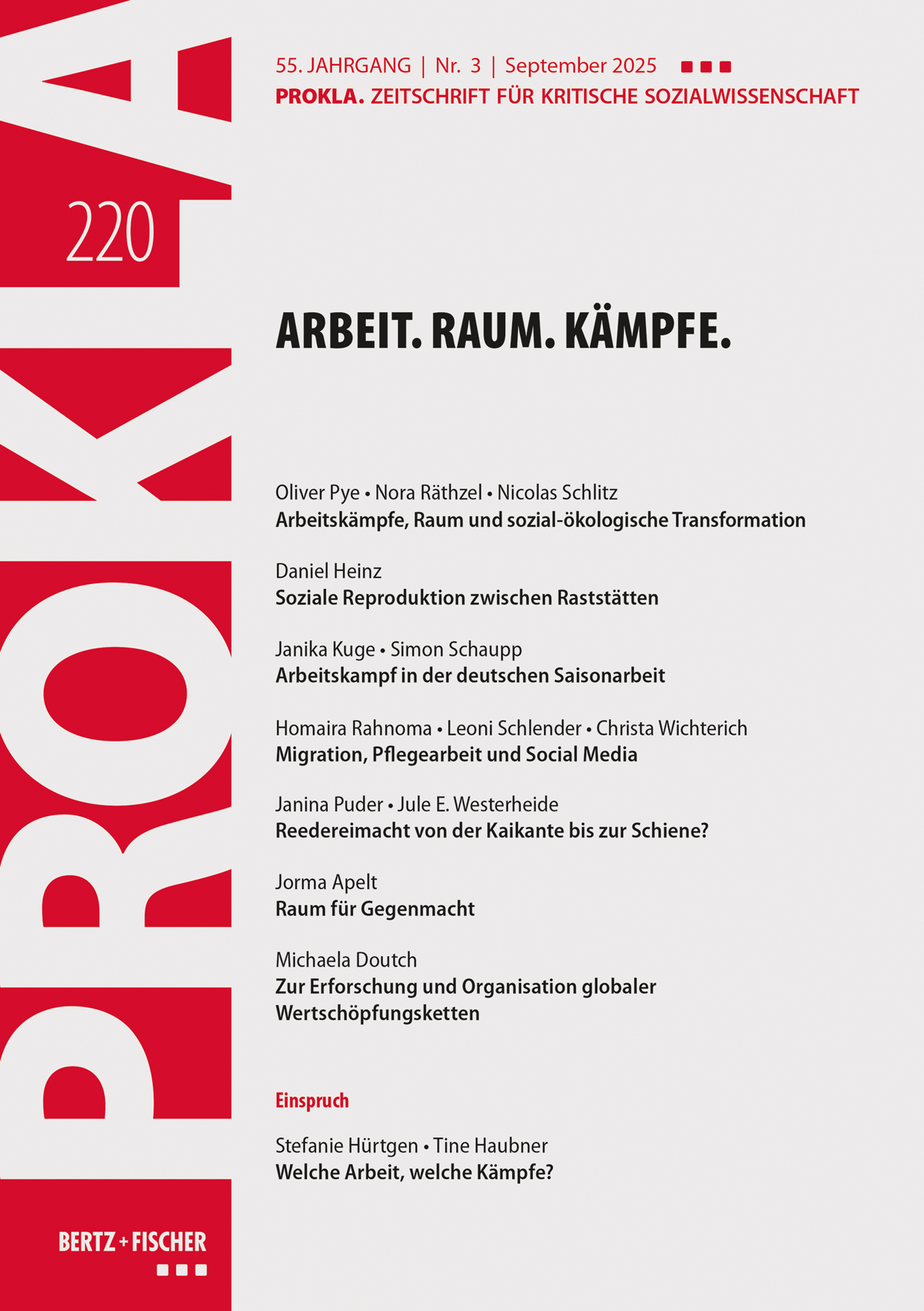Editorial: Arbeit. Raum. Kämpfe.
DOI:
https://doi.org/10.32387/prokla.v55i220.2209Schlagwörter:
Arbeit, Arbeitskämpfe, Editorial, Labour GeographyAbstract
Räumliche Veränderungen auf dem Feld der Produktion beeinflussen Arbeitskämpfe – und umgekehrt. Globalisierung, Offshoring und Outsourcing von Produktion waren teilweise Reaktionen auf erfolgreiche Organisierung von Arbeiter*innen, um das erkämpfte Lohnniveau oder errungene soziale Standards zu unterlaufen. Gleichzeitig entstehen durch räumliche Umstrukturierungen – national und global – neue Gruppen von Arbeiter*innen, die neue Formen von Kämpfen entwickeln und neue Strategien entfalten, um transnationale Kampagnen und internationale Solidarität zu organisieren. Arbeitsgeografie nimmt die räumlichen Probleme des Klassenkampfes in den Blick. Es geht um die Frage, wie Arbeiter*innen aktiv ökonomische Räume und Raummaßstabsebenen produzieren.
Downloads
Literaturhinweise
Aulenbacher, Brigitte / Haubner, Tine / Klinger, Cornelia (2024): Geld oder Leben – Sorge und Sorgearbeit im Kapitalismus. Weinheim.
Buckley, Michelle / McPhee, Siobhán / Rogaly, Ben (2017): Labour geographies on the move: Migration, migrant status and work in the 21st century. In: Geoforum 78: 153-158. DOI: https://doi.org/10.1016/j.geoforum.2016.09.012.
Birke, Peter (2022): Grenzen aus Glas. Arbeit, Rassismus und Kämpfe der Migration in Deutschland. Wien.
Buckel, Sonja / Pichl, Maximilian / Vestena, Carolina A. (2021): Rechtskämpfe. In: Zeitschrift für Kultur- und Kollektivwissenschaft 7(1): 45-82. DOI: https://doi.org/10.14361/zkkw-2021-070104.
Carswell, Gordon / de Neve, Georgina (2013): Labouring for global markets: Conceptualising labour agency in global production networks. In: Geoforum 44: 62-70. DOI: https://doi.org/10.1016/j.geoforum.2012.06.008.
Doutch, Michaela (2022): Women workers in the garment factories of Cambodia: A feminist labour geography of global (re)production networks. Berlin.
Dutta, Madhumita (2019): ›Becoming‹ factory workers: Understanding women’s geographies of work through life stories in Tamil Nadu, India. In: Gender, Place & Culture 26(6): 888-904. DOI: https://doi.org/10.1080/0966369X.2018.1552557.
Engelhardt, Anne (2020): Logistische Knotenpunkte – der Schlüssel zur Macht? Transnationale Arbeitskämpfe im europäischen Hafensektor. In: Platzer, Hans-Wolfgang / Klemm, Matthias Peter / Dengel, Udo (Hg.): Transnationalisierung der Arbeit und der Arbeitsbeziehungen. Interdisziplinäre Perspektiven. 1. Auflage. Baden-Baden: 179-213. DOI: https://doi.org/10.5771/9783845294322-179.
– (2025): Logistical Chokepoints, Precarious Work, and Social Reproduction. Labour Conflicts and the Metabolic Rift in Ports and Airports in Brazil and Portugal. Leverkusen.
Herod, Andrew (2001): Labor geographies: Workers and the landscapes of capitalism. New York.
Klosterkamp, Sarah / Petzold, Tino / Pichl, Maximilian (2023): Rechtskämpfe und Ressourcen des Rechts aus geographischer Perspektive. In: Geographische Zeitschrift 111(1): 22-41. DOI: https://doi.org/10.25162/gz-2022-0012.
Kojola, Erik (2025): Spatial and place dynamics of labour in extractive industries: challenges for just transitions. In: Herod, Andrew (Hg.): Handbook Labor Geography. Cheltenham: 555-567.
Kleinheisterkamp-González, Nicole (2023): The case for an environmental labor geography: The role of organized labor in the climate crisis. In: Progress in Human Geography 47(2): 317-332. DOI: https://doi.org/10.1177/03091325231154222.
McDowell, Linda (2015): The Lives of Others: Body Work, the Production of Difference, and Labor Geographies. Economic Geography 91(1): 1-23. DOI: https://doi.org/10.1111/ecge.12070.
Mezzadri, Alessandra (2019): On the value of social reproduction: Informal labour, the majority world and the need for inclusive theories and politics. Radical Philosophy (2)4: 33-41.
Moore, Jason W. (2015): Capitalism in the Web of Life: Ecology and the Accumulation of Capital. London, New York.
Paul, Franziska Christina / Cumbers, Andrew (2025): Organising for the energy climate emergency. In: Herod, Andrew (Hg.): Handbook Labor Geography. Cheltenham: 529-541.
Rainnie, Al / Herod, Andrew / McGrath-Champ, Susan (2011): Review and Positions: Global Production Networks and Labour. In: Competition & Change 15(2): 155-169. DOI: https://doi.org/10.1179/102452911X13025292603714.
Selwyn, Ben (2012): Beyond Firm-centrism: Re-integrating Labour and Capitalism into Global Commodity Chain Analysis. In: Journal of Economic Geography 12: 205-226. DOI: https://doi.org/10.1093/jeg/lbr016.
Silver, Beverly J. (2003): Forces of Labor: Workers’ Movements and Globalization Since 1870. Cambridge. DOI: https://doi.org/10.1017/CBO9780511615702.
Staab, Philipp / Nachtwey, Oliver (2016): Market and Labour Control in Digital Capitalism. tripleC 14(2): 457-474. DOI: https://doi.org/10.31269/triplec.v14i2.755.
Strauss, Kendra (2017): Labour geography I: Towards a geography of precarity? In: Progress in Human Geography 42(4): 622-630. DOI: https://doi.org/10.1177/0309132517717786.
– (2020): Labour geography III: Precarity, racial capitalisms and infrastructure. In: Progress in Human Geography 44(6): 1212-1224. DOI: https://doi.org/10.1177/0309132519895308.
Teerakowitkajorn, Kanokwan (2019): Masculinized labor activism and geographies of household reproduction in Thailand’s ›Detroit‹. PhD Dissertation, Syracuse University. URL: https://surface.syr.edu/etd/1033, Zugriff: 18.7.2025.
Wood, Alex J. u.a. (2019): Networked but Commodified: The (Dis)Embeddedness of Digital Labour in the Gig Economy. Sociology 53(5): 931-950. DOI: https://doi.org/10.1177/0038038519828906.





